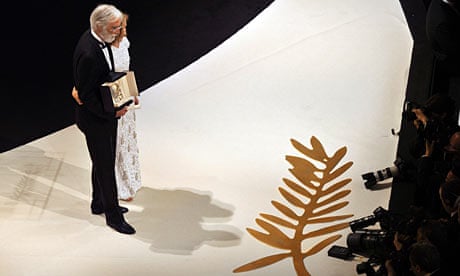It has no musical score, it's filmed in black-and-white and it's long. But Michael Haneke's German language The White Ribbon gripped audiences in Cannes and tonight took the festival's top prize, the Palme d'Or.
For many, it was the head-and-shoulders deserved winner. It tells the story of strange goings-on in a repressed and maliciously nasty northern German village shortly before the first world war. Like many films at this year's festival, it was two and a half hours long. Unlike others, it did not feel like it.
It was the Austrian auteur's first Palme d'Or, though not his first Cannes prize. He is best known in the UK for his English-language remake last year of his 1997 horror movie Funny Games, and two years before he had one of his biggest successes with Hidden, starring Juliette Binoche.
Charlotte Gainsbourg took the best actress award for her role in one of the most shocking films at Cannes, Lars von Trier's Antichrist. It was a powerful performance, in which her character performs an act of genital self-mutilation and subjects Willem Dafoe to largely unspeakable acts of torture.
Gainsbourg called Antichrist "the strongest, most painful and most exciting experience of my whole life" and paid tribute to her father Serge who would have been "proud and shocked, I hope".
The best actor award went to Christoph Waltz who plays a linguistically brilliant Nazi – the "Jew Hunter" as he is known in occupied France – in Quentin Tarantino's Inglourious Basterds. Tarantino said he almost gave up on the film, frustrated at not being able to find the right actor, and then Austrian-born Waltz came along.
Britain's Andrea Arnold won her second Cannes jury prize for her film Fish Tank about a fearless, troubled 15-year-old whose life changes when her terrible mother finally goes out with someone nice. The former Saturday morning TV presenter burst on to the film scene with Red Road three years ago winning the same prize. This year she shared it with Park Chan-Wook's Thirst, an erotic thriller about a priest who is turned into a vampire after a botched medical experiment.
The Filipino director Brillante Mendoza won best director for Kinatay and the 86-year-old director Alain Resnais, who was in competition with Wild Grass, was given a lifetime achievement award.
The Camera d'Or, which is given to the best first film, went to Australian Aboriginal director Warwick Thornton for Samson and Delilah. The fim stars two Aboriginal actors who will have to be told the news in person, as they don't have phones.
The winners were announced at the Palais tonight, chosen by a jury headed by French actor Isabelle Huppert. Also on the jury were the actors Asia Argento and Robin Wright Penn, the director James Gray and the writer Hanif Kureishi.
Kureishi likened the experience to "being in Big Brother except you can go to the movies." He added: "I have to say some of them were very, very weird indeed. I saw things I've never seen in my life before in these films."
Before the ceremony – with red carpet everywhere, young ballerinas incongruously flanking the main steps and cabaretbar jazz blasting out of speakers – Quentin Tarantino, a former jury president, said the actual decision on who wins the top prize was the easiest one.
"Normally, what happens is, there is that one movie that comes in and then it becomes easy. You can argue about the best actor, you can argue about this, you can argue about that. But the Palme d'Or should be the easiest one to give out."
This year's Cannes ran the gamut of emotions. Ken Loach cheered audiences up with Looking For Eric while von Trier brought them down with Antichrist.
Ang Lee disappointed most watchers with Taking Woodstock, Tarantino polarised critics with Inglourious Basterds and Gaspar Noé baffled many with Enter the Void, a nearly three-hour rollercoaster which one critic suggested would be a good background film to take drugs to.Noé's 162 minute film presented at Cannes includes lots of drug-taking, sex and a graphic abortion procedure.
It felt like a good year for British cinema. One of the finds of the year was the star of Arnold's Fish Tank: Katie Jarvis, who was spotted by a talent scout having a blazing row, before getting the lead role. She has since been signed by agents in the UK and the US.
The New Zealand director Jane Campion – still the only woman to win a Palme d'Or – brought her British film Bright Star, a visually beautiful story of poet John Keats's love affair with the girl next door, Fanny Brawne.
And Loach arrived with Looking for Eric, a feelgood romantic comedy which could well be his most commercially successful film. Eric Cantona stars as an imaginary life coach for a troubled Manchester postman whose world seems to be spiralling out of control.
This year's festival organisers could not be accused of ignoring the full cinematic range. Among the out-of-competition screenings were the opener, the 3D animation Up; Sam Raimi's back-to-basics horror movie Drag Me to Hell; Terry Gilliam's fantasy The Imaginarium of Doctor Parnassus – starring Heath Ledger in his last film role; and last night there was a pure visual feast, Jan Kounen's Coco Chanel & Igor Stravinsky which closed the festival.
Based on the novel by Manchester-born poet and writer Chris Greenhalgh, it tells the story of the short love affair between the ultra-independent fashion designer and the hot-headed Russian composer. While it had a few too many longeurs for some, the beauty of it – from the frocks to the furniture to the art deco wallpaper – was undeniable.
